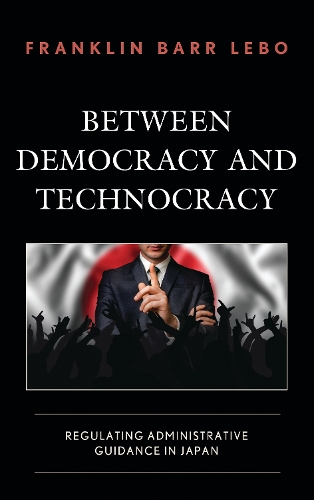
Between Democracy and Technocracy: Regulating Administrative Guidance in Japan
(Hardback)
Publishing Details
Between Democracy and Technocracy: Regulating Administrative Guidance in Japan
By (Author) Franklin Barr Lebo
Bloomsbury Publishing PLC
Lexington Books
1st May 2018
United States
Classifications
Professional and Scholarly
Non Fiction
352.80952
Physical Properties
Hardback
176
Width 161mm, Height 236mm, Spine 17mm
467g
Description
Classically, studies of the Japanese government are both tantalizing and frustrating as scholars standing outside of the system draw conclusions from significant events like crises, disasters, and moments of reform. This has led to a sense of mystery as scholars have developed sophisticated competing theories about how the system actually operates often with resigned comments that there is a black curtain (kuromaku) drawn over the system. The primary challenge is gaining access to the actual process of policymaking on a daily basis given the seemingly impenetrable nature of the bureaucracy. This study is unusual as it cracks open the curtain to see the wheels and rotating gears along with those pulling the levers. Specifically, through the Maureen and Mike Mansfield Fellowship program, the only congressionally authorized opportunity allowing American officials to be placed directly inside a foreign government, the reader is given a firsthand account of these machinations. Through their eyes, readers will be introduced to Japans messy policymaking process in telecommunications regulation, pharmaceutical approvals, diplomatic relations, and much more. This approach also allows the author to refine existing theories of Japans bureaucratic elite and assess the weak system of control exercised over them by the National Personnel Authority (NPA). This understudied agency is the last vestige of MacArthurs legacy as the Supreme Commander of the Allied Powers in Japan following World War II. Thus, this study ambitiously hopes to lend a realistic glimpse into the only developed, non-western, industrialized democratic state in the world. More boldly, this study intends to lend a greater appreciation of the complex tug-of-war between democracy and technocracy in other national contexts.
Reviews
This is a substantial work of original research and synthesis around the idea of bureaucratic drift and the conditions under which officials in Japans ministries exercise enhanced bureaucratic discretion in the implementation of government policy. It contains valuable new perspectives on the relationship between politicians and bureaucrats in Japan and, more broadly, the important link between democracy and bureaucracy. -- Aurelia George Mulgan, Australian Defence Force Academy
This book applies principal-agent theory to Japanese national public administration. Its working hypothesis is that in Japanese politics (in this sense modeled on the UK system) politicians decide policy and public servants implement it. In practice, of course, things are more complicated, since in Japan particularly (but elsewhere as well), government officials provide much original input into policy making. We find here much useful empirical material, including a well researched analysis of the National Personnel Authority, on which rather little has been published in English. -- Arthur Stockwin, University of Oxford
Author Bio
Franklin Barr Lebo is assistant professor of sustainability and faculty in the Asian Studies Program at Baldwin Wallace University.
